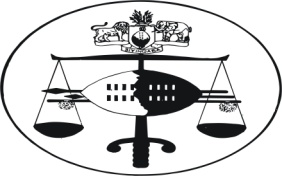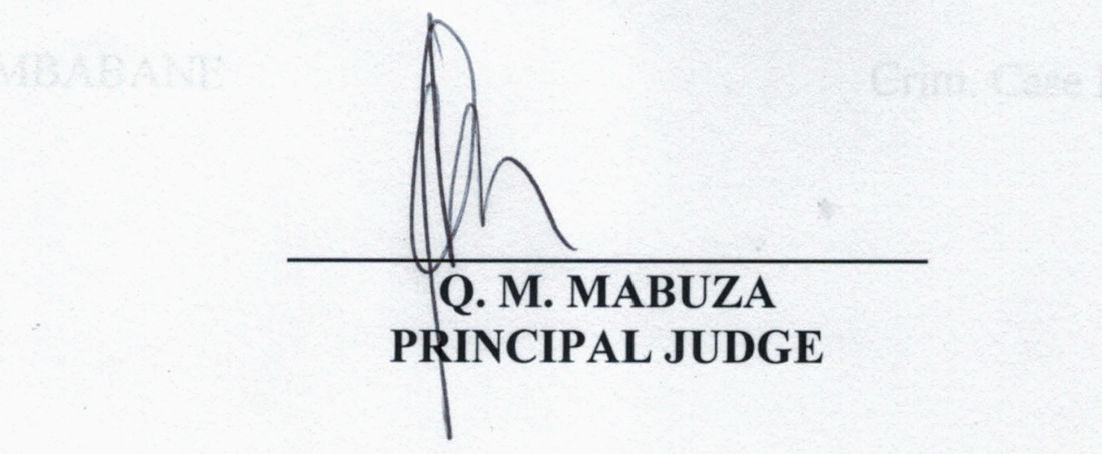
IN THE HIGH COURT OF SWAZILAND
HELD AT MBABANE CASE NO. 1144/2016
In the matter between:
WOLFGANG HEINRICH MINK APPLICANT
and
SAMKELISIWE NONHLANHLA VILAKATI 1ST RESPONDENT
REGISTRAR OF DEEDS 2ND RESPONDENT
THE ATTORNEY GENERAL 3RD RESPONDENT
In re:
MINK WOFGANG HEINRICH PLAINTIFF
And
SAMKELISIWE NONHLANHLA VILAKATI 1ST DEFENDANT
REGISTRAR OF DEEDS 2ND DEFENDANT THE ATTORNEY GENERAL 3RD DEFENDANT
Neutral Citation : Wolfgang Heinrich Mink vs Samkelisiwe Nonhlanhla
Vilakati (1144/2016) [2017] SZHC 193 (19 SEPTEMBER 2017)
Coram : MABUZA - PJ
Heard : 26 JUNE 2017
Delivered : 19 SEPTEMBER 2017
SUMMARY
Civil Procedure: Application to stay an application granted under Rule 47 (4) – Application to rescind order of 21 October 2016 - Application to rescind order for the provision of security – Application dismissed with costs.
JUDGMENT
MABUZA -PJ
[1] This matter came by way of urgency. The Applicant an adult of Ezulwini seeks an order in the following terms:
Dispensing with full and proper compliance with the Rules relating to service and time limits by reason of the urgency of the matter.
Issuing a rule nisi, operating with interim effect, calling upon the 1st Respondent to show cause why:
Her application in terms of Rule 47 (4) should not be stayed pending the determination of this application;
The order granted on the 21st October, 2016 (staying the action proceedings and the interlocutory application) should not be rescinded or set aside.
The order granted on the 13th April, 2017 [requiring security for costs) should not be rescinded or set aside.
Costs only in the event of opposition.
Granting further or alternative relief.
[2] The matter is opposed by the 1st Respondent who is described as an adult
Swazi female of Mankayane in the Manzini District.
[3] The 2nd Respondent is the Registrar of Deeds for Swaziland.
[4] The 3rd Respondent is the Attorney General of Swaziland cited herein in his
official capacity as the legal representative of the Government.
[5] On the 30th of June 2016 the Applicant instituted an action seeking that he be substituted in the place of the of the 1st Respondent as the registered owner of Lot 286 Mankayane Township Extension 2. The basis of the order sought was that the Applicant had bought the property and that it had been registered in the name of the 1st Respondent in a nominal capacity and further that she had no beneficial interest therein. The action was defended by the 1st Respondent and a plea was subsequently filed.
[6] On the 27th of September 2016 the Applicant instituted an urgent application seeking an interdict against the 1st Respondent who had by then placed the property on sale. The purpose of the interdict was to stop the intended sale and alienation of the property.
[7] On the 21st October 2016 the 1st Respondent obtained an order staying the action and urgent application pending furnishing security for costs of the litigation by the Applicant.
[8] The order was pursuant to an order granted by His Lordship Nkosi J on 16 September 2016 and that it was an alternative one to the primary order which was being sought, being an order dismissing the action proceedings and interlocutory Application.
[9]
[10] It would appear that the order to provide security for costs was granted on the 16th September 2016 and that the Applicant successfully contested the amount because it was reduced from E70,000.00 (Seventy thousand Emalangeni) to E50,000.00 (Fifty thousand Emalangeni).
[11] Citizenship was granted to the Applicant on the 21st August 2008. However at the time the above order was issued he was unable to produce proof of citizenship until this year (2017). That was his fault and not the error of the court because at that time the 1st Respondent had successfully raised the issue of him being a peregrines.
[12] The Applicant accepted this order because he did not challenge it for seven months after it was granted. Furthermore, he accepted the order because at paragraph 14 of his founding affidavit he states:
“Sometime last year my erstwhile attorney did mention the issue of security and I paid over to him an amount of E20,000.00 for the foresaid purpose. I do not know what became of this money. At the time of preparation of this urgent application I had not had the time of raising the issue with him”.
[13] Crucially this means that the issue was not urgent as stated by the Applicant. In Marhad Investments (Pty) Ltd v Thandi Ginindza, Civil Case No. 516/2006, the court had the following to say regarding a determination of urgency in the matter:
“Clearly the Applicant has been aware of the writ for at least a period of three weeks. The Applicant does not state why it took so long to bring the application if there was such urgency”.
Rescission
[14] In casu the Applicant relies on an alleged error on the part of the Court. Such an application would fall under Rule 42 (a) which states:
“(1) The Court may, in addition to any other powers it may have,
mero motu or upon the application of any party affected, rescind or vary:
an order or judgment erroneously granted in the absence of any
party affected thereby.
[15] As mentioned in paragraph12 supra, the fact that the Applicant was a citizen arose well after the Court had granted the order, there was no error.
Acquiescence
[16] The doctrine of acquiescence is also referred to as the doctrine of pre-emption. In the case of Jimson Jeke Tfwala v Swaziland Development Finance Corporation Civil Appeal Case (71/2015) [2016] SZHC 72 (30 June) Justice Odoki JA, writing for the Court stated as follows:
“47. …the principles of the doctrine of acquiescence were canvassed in the case of Botha v White 2004 (3) SA 184 where the court stated,
“31. The doctrine of acquiescence is competent to halt cases where its application is necessary to attain just and equitable results. The test for inferred acquiescence is the impression created by the Plaintiff or Applicant on the Defendant or Respondent. It can be proven by some act, conduct or circumstances on the part of the Plaintiff or Applicant, for example by the Applicant’s delay in taking, action, so that the Respondent is lulled into a false sense [of] security. Then in such circumstances the enforcement of a right would cause a real inequity and the Applicant’s conduct issued amount to unconscionable conduct.
48. The Respondent also relied on the case of Hartley, Roegshaan and Another v First Rand Limited and Another, High Court case No. 27612/2010 where the Court held that according to the common law doctrine of preemption a party who has acquiesced to a judgment cannot subsequently seek to challenge the judgment because he cannot be allowed to opportunistically endorse two conflicting positions or both approbate and reprobate, or to blow hot and cold. In other words, a party cannot be allowed to have his cake and eat it too. The conduct of the Applicant must be unequivocal and inconsistent with any intention to appeal. See Bhekiwe Vumile v Standard Bank Swaziland, Appeal Case 13/2005”.
[17] The Applicant has for the past seven (7) months taken a position of complying with the order to pay security for costs, this is also conceded to in paragraph 14 of the Applicant’s founding affidavit where he states:
“Sometime last year my erstwhile attorney did mention the issue of security and I paid over to him an amount of E20,000.00 for the foresaid purpose. I do not know what became of this money. At the time of preparation of this urgent application I had not had the time of raising the issue with him”.
[18] I agree with Mr. Ndlangamandla’s submission that the Applicant cannot now reprobate and seek to challenge by way of rescission the same order that he has complied with all along.
Unclean hands
[19] Mr. Ndlangamandla pointed out to the Court that the Applicant has come to this Court with unclean hands in that he has refused to obey or has defied this Honourable Court’s order of furnishing security for costs for a period of over seven (7) months and has still not complied with the order and that the Applicant should purge his contempt first before seeking audience with this Court. I agree with Mr. Ndlangamandla.
[20] However, the Applicant complained that the amount of security required from him was on the steep side and asked for it to be set aside because he had found his citizenship certificate and had filed same with these papers before me.
[21] Mr. Dlamini requested that this Court set aside the amount under prayer 4 which is: “granting further or alternative relief”.
[22] I am persuaded by this submission on the basis of the interests of justice.
[23] The order of the Court is as follows:
(a) The amount of security in the sum of E50,000.00 (Fifty thousand
Emalangeni) is hereby set aside.
(b) The Applicant is hereby ordered to pay the costs of suit herein.

For the Applicant : Mr. S.C. Dlamini
For the Respondent : Mr. M. Ndlangamandla
10